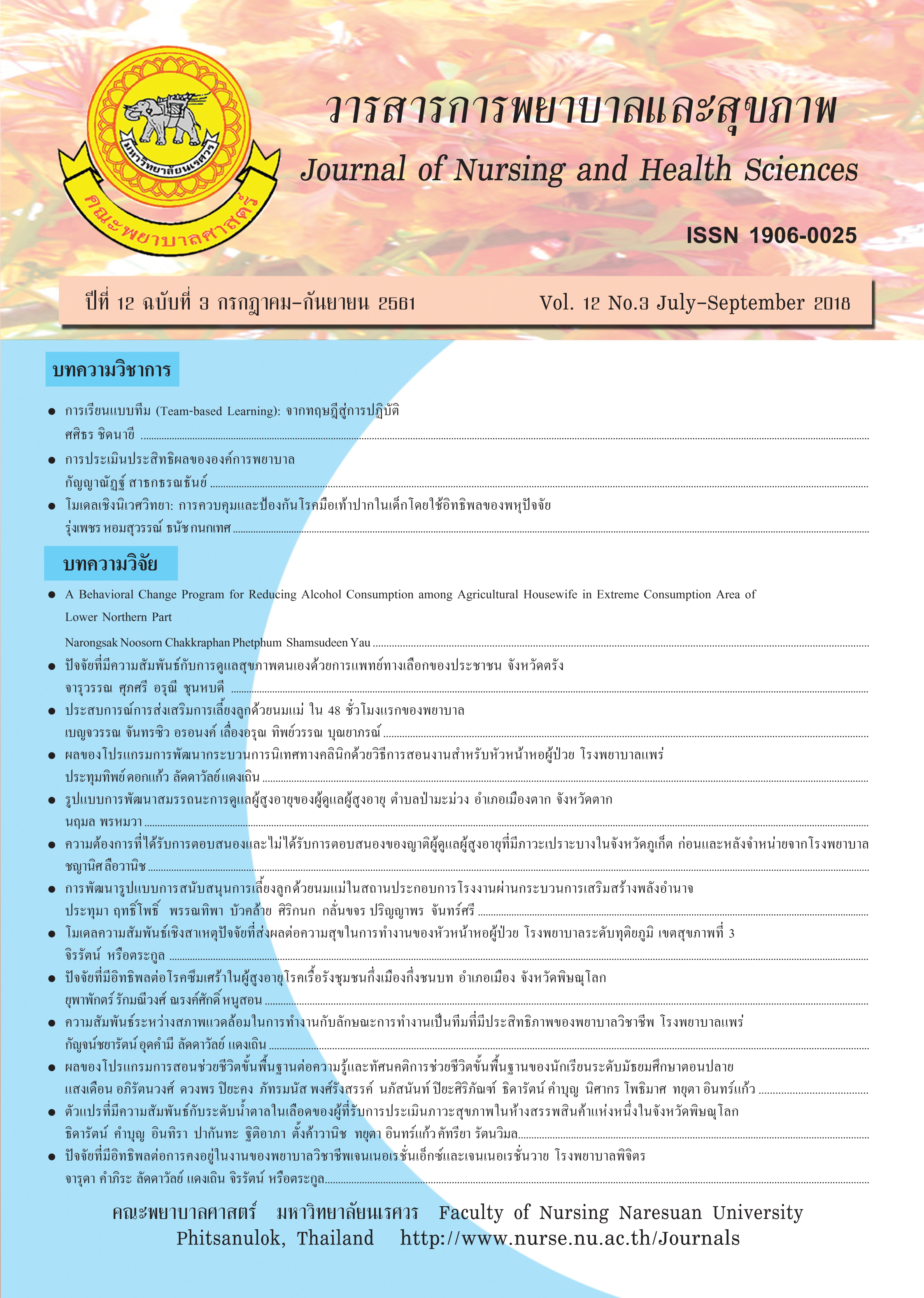ความต้องการที่ได้รับการตอบสนองและไม่ได้รับการตอบสนองของญาติผู้ดูแลผู้สูงอายุ ที่มีภาวะเปราะบางในจังหวัดภูเก็ต ก่อนและหลังจำหน่ายจากโรงพยาบาล
Main Article Content
บทคัดย่อ
การวิจัยมีวัตถุประสงค์เพื่อศึกษา 1) ความต้องการของญาติผู้ดูแลที่ได้รับการตอบสนองในการดูแล ผู้สูงอายุเปราะบางก่อนและหลังจำหน่าย 2) ความยากลำบากของญาติผู้ดูแลในการดูแลผู้สูงอายุหลัง จำหน่าย และ 3) สิ่งที่ญาติผู้ดูแลไม่ได้รับการตอบสนองก่อนและหลังจำหน่าย โดยการวิจัยผสมผสานที่มี การศึกษาเชิงคุณภาพเป็นหลัก ผู้ให้ข้อมูลหลัก 108 คน ได้แก่ พยาบาลวิชาชีพที่รับผิดชอบงานเยี่ยมบ้าน และการดูแลระยะยาว ญาติผู้ดูแล อาสาสมัครสาธารณสุขประจำหมู่บ้าน อาสาสมัครดูแลผู้สูงอายุ เก็บรวบรวม ข้อมูลด้วยการสัมภาษณ์เชิงลึก การสนทนากลุ่ม การสังเกตแบบไม่มีส่วนร่วม วิเคราะห์ข้อมูลด้วยการ วิเคราะห์เปรียบเทียบ การศึกษาเชิงปริมาณเป็นส่วนเสริม คัดเลือกกลุ่มตัวอย่างแบบเฉพาะเจาะจง 82 คน เก็บรวบรวมข้อมูลด้วยแบบสอบถาม วิเคราะห์ข้อมูลด้วยสถิติเชิงพรรณนา ผลการวิจัยพบว่าความต้องการของญาติผู้ดูแลที่ได้รับการตอบสนองก่อนและหลังจำหน่ายอยู่ในระดับ ปานกลาง ก่อนจำหน่ายได้รับการตอบสนองสูงสุด คือ การสอนการช่วยเหลือการทำกิจวัตรประจำวัน หลังจำหน่ายได้รับการตอบสนอง 1) การสนับสนุนผ้าอ้อมผู้ใหญ่ 2) พยาบาลมาเยี่ยม 3) อาสาสมัคร เยี่ยมบ้าน 4) โรงพยาบาลทำอาหารปั่นผสมขาย 5) การทำกายภาพบำบัด ความยากลำบากในการดูแล ผู้สูงอายุหลังจำหน่าย 1) ด้านการพยาบาล 2) การจัดการอารมณ์ของผู้สูงอายุ 3) ปัญหาโรคประจำตัวของ ญาติผู้ดูแล 4) ยก/เคลื่อนย้ายผู้สูงอายุไม่ไหว 5) ค่าใช้จ่ายสูง 6) ผู้สูงอายุไม่ให้ความร่วมมือ สิ่งที่ญาติผู้ดูแล ไม่ได้รับการตอบสนอง คือ การตอบสนองด้านอารมณ์ จิตใจ ด้านข้อมูลทางการแพทย์ รวมทั้งคำแนะนำ ในการติดต่อขอความช่วยเหลือ การจัดการกับอารมณ์ของผู้สูงอายุ กำหนดเวลาที่ผู้สูงอายุจะหาย การปฏิบัติ เมื่อท่อเจาะคอหลุด การทำบัตรประจำตัวผู้พิการ
Article Details
เอกสารอ้างอิง
เมือง จังหวัดภูเก็ตในการดูแลผู้สูงอายุอย่างมี
ส่วนร่วม. ภูเก็ต: มหาวิทยาลัยราชภัฏภูเก็ต.
ชญานิศ ลือวานิช, รัตนา ลือวานิช และจิตรา โรมินทร์.
(2556). ความสามารถเชิงปฏิบัติของผู้สูงอายุ
ที่อยู่ในภาวะพึ่งพิง บริการการดูแลระยะยาว
สำหรับผู้สูงอายุที่มีภาวะพึ่งพิงและความต้องการ
ของญาติผู้ดูแลต่อการดูแลผู้สูงอายุที่มีภาวะ
พึ่งพิงของจังหวัดภูเก็ต. ภูเก็ต: มหาวิทยาลัย
ราชภัฏภูเก็ต.
ปราโมทย์ ประสาทกุล.(2558). สถานการณ์ผู้สูงอายุไทย
พ.ศ. 2557. กรุงเทพฯ : อมรินทร์ พริ้นติ้งแอนด์
พลับชิง จำกัด (มหาชน).
ยุพาพิน ศิรโพธิ์งาม. (2555). ชีวิตญาติผู้ดูแลผู้ป่วยเรื้อรัง.
ในเอกสารประกอบการประชุมวิชาการ เรื่อง
การดูแลญาติผู้ดูแลผู้ป่วยเรื้อรัง. (หน้า 16 - 23)
โรงเรียนพยาบาลรามาธิบดี คณะแพทยศาสตร์
โรงพยาบาลรามาธิบดี มหาวิทยาลัยมหิดล
วิชัย เอกพลากร. (2552). รายงานการสำรวจสุขภาพ
ประชาชนไทยโดยการตรวจร่างกาย ครั้งที่ 4
พ.ศ. 2551-2. นนทบุรี: เดอะ กราฟฟิกซิสเต็มส์
จำกัด.
สุมาลี เยี่ยมสมัย, รัตนา เหมือนสิทธิ์ และจรูญศรี
ทองมาก. (2555). รูปแบบการดูแลผู้สูงอายุของ
อาสาสมัครผู้ดูแลผู้สูงอายุในเขตเทศบาลตำบล
พุกร่าง อำเภอพระพุทธบาท จังหวัดสระบุรี. วารสาร
พยาบาลกระทรวงสาธารณสุข. 22(3), 77-87.
สำนักงานสาธารณสุขจังหวัดภูเก็ต. (2558). เอกสาร
ประกอบการตรวจราชการและนิเทศงาน
กรณีปกติ รอบที่ 2 ประจำปีงบประมาณ 2558.
ภูเก็ต : สำนักงานสาธารณสุขจังหวัดภูเก็ต.
Bakas, T., Austin, J.K., Okonkwo, K.F., Lewis, R.R.,
& Chadwick, L. (2002). Needs concerns,
strategies, and advice of stroke caregivers the
first 6 months after discharge. Journal of
Neuroscience Nursing. 34(5), 242-251.
Graham, C.L., Ivey, S.L., & Neuhauser, L. (2009).
From hospital to home: Assessing the
transitional care needs of vulnerable seniors.
The Gerontologist. 49(1), 23-33.
Hare, R., Rogers, H., Lester, H., McManus, R.J., &
Mant, J. (2005). What do stroke patients and
their carers want from community services?.
Family Practice. 23, 131-136.
Hendrix, C., Tepfer, S., Fores, S., Ziegler, K., Fox, V.,
Stein, J., McConnell, E.S., Hastings, S.N.,
Schmarder, K., & Colon-Emeric, C. (2012).
Transitional care partners: A hospital-to-home
support for older adults and their caregivers.
Journal of the America Association of Nurse
Practitioner. 25(2013), 407-414.
Hirakawa, Y., Kuzuya, M., Enoki, H., & Uemura, K.
(2011). Information needs and sources of family
caregivers of home elderly patients. Archives
of Gerontology and Geriatrics. 52 (2), 202- 205.
Houtven, C.K.V. (2015). Informal care and economic
stressors. In J.E. Gaugler, R.L. Kane. (Ed.).
Family caregiving in the new normal. (pp.
105- 133). Amsterdam: Elsevier.
King, R.B., & Semik, P.E. (2006). Stroke caregiving :
Difficult times, resource use, and needs during
the first 2 years. J Gerontology Nurs. 32(4), 37-44.
Lethin, C., Leino-Kilpi, H., Roe, B., Soto, M.M., Saks,
K., Stephan, A., Zwakhollens, S., Zabalegui,
A., & Karlsson, S. (2016). Formal support for
informal caregivers to older persons with dementia
through the course of the disease: An exploratory,
cross-sectional study. BMC Geriatrics. 16 (32), 1-15.
Lipson, D.J. (2015). The policy and political environment
of family caregiving: A glass half full. In J.E.
Gaugler, R.L. Kane. (Ed.). Family caregiving
in the new normal. (pp.137-151). Amsterdam:
Elsevier.
Maclsaac, L., Harrison, M.B. & Godfrey, C.G. (2010).
Supportive care needs of caregivers of
individuals following stroke: A synopsis of
research. Canadian Journal of Neuroscience
Nursing. 32(1), 39-46.
Naylor, M. & Keating, S.A. (2008). Transitional care:
Moving patients from one care setting to
another. Am J Nurs. 108(9 Suppl), 58-63.
Quail, J.M.,Walfson, C. & Lippman, A. (2011). Unmet
need for assistance to perform activities of daily
living and psychological distress in community
-dwelling elderly woman. Canadian Journal on
Aging. 30(4), 591-602.
Reinhard, S.C. & Feinberg, L.F. (2015). The escalating
complexiety of family caregiving: Meeting the
challenge. In J.E. Gaugler, R.L. Kane. (Ed.).
Family caregiving in the new normal. (p.p.
291-303). Amsterdam : Elsevier.
Rivera, D., Perrin, P.B., Senra, H., Senra, H., Reyes,
C.J.D.I., Olivera, S.L., Villasenor, T., Moreno, A.,
& Arango-Lasprilla, J.C. (2013). Development
of the family needs assessment tool for caregivers
of individual with neurological conditions in
Latin America. Psicologia desde el Caribe.
Universidad del Norte. 30(1), 1-20.
Sayles-Cross, S. (1993). Perceptions of familial
caregivers of elder adults. IMAGE: Journal of
Nursing Scholarship. 25(2), 88-92.
Schubart, J.R., Kinzie, M.B. & Farace, E. (2008).
Caring for the brain tumor patient: Family
caregiver burden and unmet needs. Neuro-
Oncology. 10(1), 61-72.
Shyu, Y.L. (2000). The needs of family caregivers
of frail elders during the transition from hospital
to home: a Taiwanese sample. Journal of
Advanced Nursing. 32(3), 619-625.
Silva, A.L., Teixeira, H.J., Teixeira, M.J.C. & Freitas,
S. (2013). The needs of informal caregivers of
elderly living at home: An integrative review.
Scandinavian Journal of Caring Sciences. 27(4),
792-803.
Stirling, C., Andrews, S., Croft, T., Vickers, J., Turner,
P., & Robinson, A. (2010). Measuring dementia
carers’ unmet need for services-an exploratory
mixed methods study. BMC Health Services
Research. 10, 122-131.
Takamura, J. & Williams, B. (1998). Informal
caregiving: Compassion action. Washington:
Department of Health & Human Services.
Touhy, T.A. (2008). Gerontological nursing and aging
society. In P. Embersole, P. Hess, T.A. Touhy,
K. Jett, & A.S. Luggen. Toward healthy aging:
Human needs & nursing response. (7 th ed, pp.
1-25). Missouri: Mosby Elevier.
United Nations. (2007). Major developments and trends
in population aging. New York : United Nations.
Yedidia, M.J. & Tiedemann, A. (2008). How do family
caregivers describe their needs for professional
help?. Journal of Social Work Education. 44(3),
35-37.
Zabalegui, A., Bover, A.. Rodriquez, E., Caberara, E.,
Diaz, M., Gallart, A., Gonalez, A., Gual, P.,
Izquierdo, M.D., Lopez, L., Pulpon, A.M.,
Ramirez, A. (2008). Informal caregiving:
Perceived needs. Nursing Science Quarterly.
21(2), 166-172.


